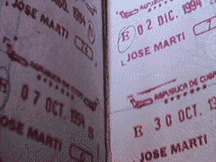
[ Metro | Metroactive Central ]
Border Bother
Cold War ritual continues
By Dan Pulcrano
Don't get your passport stamped like this when you go to Cuba illegally, unless you want to answer a lot of questions on the way back.
"What are you bringing back?"
"Rum and cigars."
"Where'd you buy them?"
"Cuba."
The customs agent's eyes widen.
"Do you have a Treasury Department license to travel to Cuba?"
"No, I'm a journalist."
So began the stupid ritual. Even though working journalists are exempt from the U.S. ban on travel to Cuba, and authorized travelers are permitted to bring back $100 worth of the Cuban goods, officials take to heart their charge to enforce the last vestige of Cold War denial. And even though they never arrest or imprison violators as far as I know, our federales are determined to make returning from Communist Cuba to the land of the free as unpleasant an experience as possible.
So, after tearing through my baggage, the pay stub deduction relieved me of one bottle of Havana Club rum and a box of Monte Cristo cigars. Then he discovered my $2 snake: a two-foot-long dried bean pod with red and black stripes and "Cuba" painted on its head, just above the glued-on googlie eyes.
"You can't bring that in."
"Why not? It says right here you can bring back religious articles."
"Wha?"
"Santeria."
I shook the snake and demonstrated its demon-repelling qualities. He summoned the agriculture inspector.
"Okay, you can bring it in if you open it up and take out the seeds," she conceded.
"Then it won't rattle and ward off the evil spirits," I argued fruitlessly.
Now, this story might be funny if it hadn't been for what they did that same afternoon to Hella and Frank Roubicek.
Hella, a former Willow Glen schoolteacher now in her 60s, is one of the few remaining survivors of the voyage of the S.S. St. Louis, an ocean liner that transported 935 Jewish refugees from Nazi Germany to Havana in the spring of 1938. Their ticket to freedom turned into the boat ride from hell when the Cuban and U.S. governments denied the refugees asylum and returned them to Europe, where the majority died in Hitler's death camps.
Her story is only overshadowed by that of her husband, Frank, 84, who spent four years staring death in the face beneath the gun turrets of Buchenwald and Rehmsdorf.
For Hella and Frank, being detained by U.S. federal agents and having their passports photocopied last April after participating in a religious and humanitarian mission to visit Havana's tiny Jewish community recalled all too poignantly the nightmares of vulnerability at the hands of the Nazis that they have tried to put behind them as U.S. citizens.
They know that somewhere in a government computer now lies a record of their ostensibly illegal excursion, due to a law they unwittingly broke after the U.S. Department of Treasury refused, at the eleventh hour, to grant a religious exemption for the Passover trip.
Palo Alto resident Dorothy Bender was also on that trip. When she returned from a Mexican vacation last week, a customs agent in San Francisco glanced at the monitor and asked her if she had been in the Bahamas--a transit point to Cuba--recently.
"I said 'yes' and then asked him, 'What else do you see on the monitor?' " Bender writes in an email message. "He grinned and said he sees a lot. I asked him, 'What does that mean?' and he didn't answer. He kept grinning."
This joke of a policy might be a little more humorous were it not for the fact that 11 million mostly educated and peaceful Cubans have been reduced to citizens of a beggar nation. The combined effects of the Soviet Union's collapse and the U.S. trade embargo has left Cuba's cities crumbling, its cars without fuel, its clinics without medicine, its families without food, its homes without electricity and water, its children without milk or soap, its women without tampons. They are human pawns in a test of wills between Jesse Helms and Fidel Castro as Congress considers expanding sanctions to nations that trade with the communist state.
Beyond the human price, Sen. Helms' "Cuban Liberty and Democratic Solidarity Act" is just bad business. America is missing a chance to invest in the future of one of its closest neighbors, while contemplating a serious rift in relations with its Canadian, Mexican and European allies, who maintain more enlightened trade policies.
There are those who argue, with compelling moral weight, that the United States should continue the pressure long enough to bring Castro to his knees; why should we reward a government that jails dissidents, restricts newspapers, runs a centralized economy and outlaws opposition parties?
If that's the case, then Congress should immediately vote to end diplomatic relations with China. And let's not forget Saudi Arabia is not exactly a multiparty democracy.
Slowly and painfully, the last shovels of dirt are being thrown on the Cold War and its ugly history. In April, the State Department announced a policy that for the first time puts Cuban refugees on an equal footing with other Latin Americans seeking to emigrate for economic reasons. And this week, the Clinton administration announced the normalization of relations with Vietnam's government.
Can Cuba be far behind?
[ Metro | Metroactive Central ]
From the Oct. 19-25, 1995 issue of Metro

Digital photo by Dan Pulcrano. © 1995